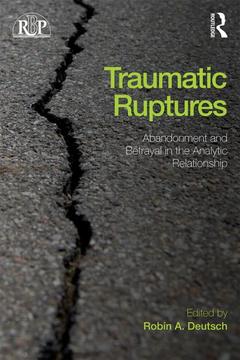Traumatic Ruptures: Abandonment and Betrayal in the Analytic Relationship Abandonment and Betrayal in the Analytic Relationship Relational Perspectives Book Series
Coordonnateur : Deutsch Robin A.

For much of its history, psychoanalysis has been strangely silent about sudden ruptures in the analytic relationship and their immediate and far-reaching effects for those involved. Such issues of betrayal and abandonment ? the death of an analyst, a patient?s suicide, an ethical violation ? disrupt the stability and cohesion of the analytic framework and leave indelible marks on both individuals and institutions alike.
In Traumatic Ruptures an international range of contributors present first-person, highly personal and sometimes painful accounts of their experiences and the occasionally difficult yet redeeming lessons they have taken from them. Presented in four parts, the book explores multiple meanings and consequences of the break in the analytic relationship. Part One, Ruptured Subjectivity: Lost and Found, presents accounts of clinical encounters with death. Part Two, Rupture: The Clinical Process,addresses the sudden loss of an analyst, the trauma of patient suicide and the issue of countertransference when working with patients who have suffered the unexpected loss of their first analyst. Part Three, The Long Shadow of Rupture, examines the effects of ethical violations in the short and long term. Finally, Part Four, Ruptures? Impact on Organizations, looks at the wider impact of ethical and sexual boundary violations in the context of an organization and the effect of trauma on a psychoanalytic institute. By giving voice to issues that are usually silenced, the authors here open the door to understanding the complex nature of traumatic rupture within the analytic field.
This intimate exploration of psychoanalytic treatments and communities is ideal for psychoanalysts, psychologists, clinical social workers, psychiatrists and family therapists. It is an important text for clinicians working with individuals who have experienced traumatic ruptures and for members of organisations dealing with their effects.
Contributors. Foreword by Muriel Dimen. Acknowledgements. 1. Introduction Robin Deutsch. Section 1: Ruptured Subjectivity: Lost and Found. 2. Psychoanalytic Process in the Shadow of Rupture: Clinical Encounters with Death, Dead Mothers, and Deadly Mothers Adrienne Harris. 3. A Voice Lost, A Voice Found: After the Death of the Analyst Robin Deutsch. Section 2: Rupture: The Clinical Process. 4. Abandoned without Warning: Resonance of the Shame of Early Loss When an Analyst Dies Jenny Randles and Frances Thomson-Salo. 5. The Trauma of Patient Suicide Jane Tillman and Anne Carter. 6. On Being the Second Analyst: Two Patients Who Suffered Unexpected Loss of their First Analyst and the Issue of Countertransference Madeleine Bachner.Section 3: The Long Shadow of Rupture. 7. Losing a Training Analyst for Ethical Violations: Short-Term and Long-Term Effects Elizabeth Wallace. 8. Collateral Damage: The Fallout from Analyst Loss due to Ethical Violations Candace Young. 9. A Chorus of Difference: Evolving from Moral Outrage to Complexity and Pluralism Jane Burka.Section 4: Ruptures’ Impact on Organizations. 10. Silencing: When a Community Loses an Analyst to Ethical Violations Kathy Sinsheimer. 11. Trouble in the Family: The Impact of Sexual Boundary Violations in Analytic Institute Life Donna Fromberg. 12. Trauma as a Way of Life in a Psychoanalytic Institute Charles Levin. 13. Saying Goodbye: Traumatic Reverberations in the Subjective Sense of Time Dianne Elise.
Robin A. Deutsch is Member and Faculty of the San Francisco Center for Psychoanalysis, where she currently serves as President of the Center. She maintains a private practice of psychoanalysis, psychotherapy, and consultation in Oakland, California, and is particularly interested in the development of analytic identity, therapist subjectivity, and the effects of the sudden loss of an analyst.
Date de parution : 05-2014
Ouvrage de 304 p.
15.2x22.9 cm
Disponible chez l'éditeur (délai d'approvisionnement : 14 jours).
Prix indicatif 58,78 €
Ajouter au panierDate de parution : 04-2014
Ouvrage de 304 p.
15.2x22.9 cm
Disponible chez l'éditeur (délai d'approvisionnement : 14 jours).
Prix indicatif 220,72 €
Ajouter au panierThème de Traumatic Ruptures: Abandonment and Betrayal in the... :
Mots-clés :
analyst; sexual; analysts; boundary; violations; dead; ethical; death; violation; training; Young Man; Violate; Sexual Boundary Violations; Required Confi Dentiality; Traumatic De-idealization; Analyst Death; Training Analyst System; Traumatic Ruptures; Ethical Violation; Boundary Violations; Fi Rst Analyst; Dead Analyst; Commit Boundary Violations; TAs; Bob’s Death; Analyst Loss; Institutional Illness; Basic Assumption Group; Senior Analyst; Ethics Investigation; Sexual Misconduct; Dead Therapist; Patient Suicide; Post-termination Phase; Candidate Group



